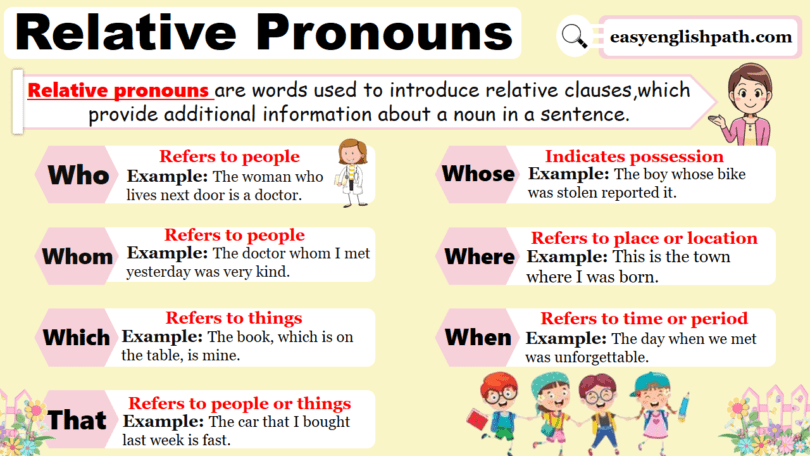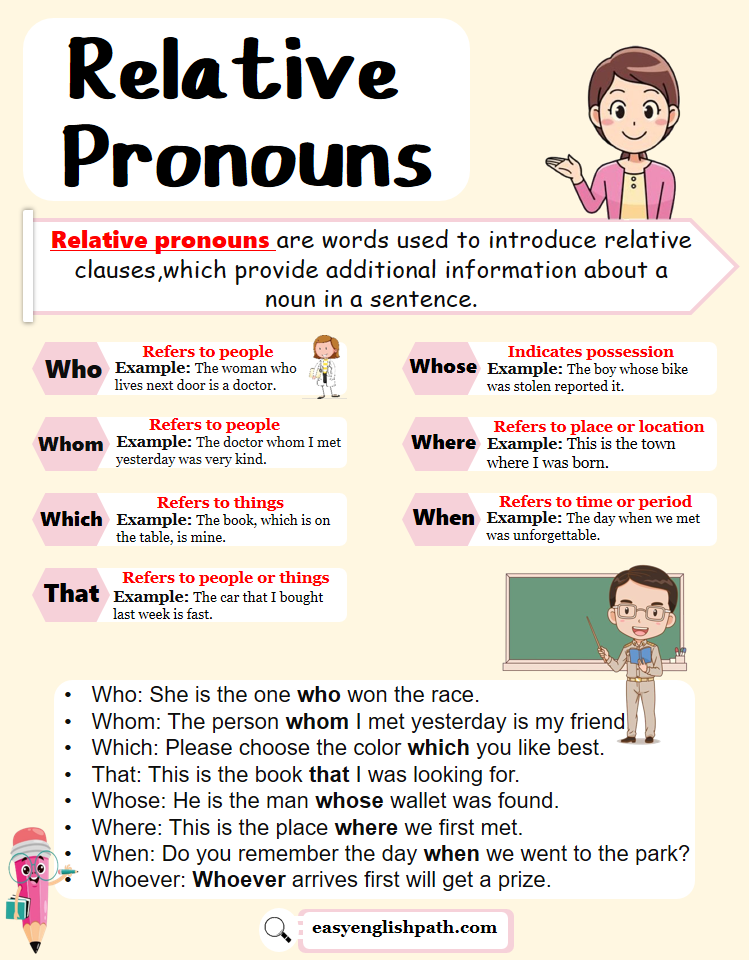Relative pronouns are important words in grammar. They are used to join two different parts of a sentence. You may recognize some of them like who, which, and that. They are used to point to the thing or person you’re talking about. Relative pronoun examples include, The cat that ran away is mine. Here, “that” is being used to point to the cat.
These words make sentences clearer by providing more information about something. They’re like small assistants that are used to link thoughts together.
What are Relative Pronouns?
Relative pronouns are words that introduce relative clauses, which add extra information about a noun in a sentence. They connect a dependent clause (the relative clause) to the main clause, helping to describe or identify the noun more clearly.
- The person who called me is my friend.
- To whom did you give the book?
- The car that is parked outside is mine.
Types of Relative Pronouns
- Subject Relative Pronouns
- Object Relative Pronouns
- Possessive Relative Pronouns
- Zero Relative Pronouns
1. Subject Relative Pronouns
These pronouns act as the subject of the relative clause. They are used only when the relative clause describes the subject of the main clause.
Example words: Who, Whose, That, Which, Whom
- The boy who won the race is my cousin.
- The book that inspired me was written by a famous author.
2. Object Relative Pronouns
These relative pronouns act as the object of the relative clause. They are used when the relative clause describes the object of the main clause.
Example words: Who, Which, That, Whom
- The man whom we met yesterday is a doctor.
- The movie which I watched last night was amazing.
3. Possessive Relative Pronouns
These pronouns indicate ownership within the relative clause. The most common possessive relative pronoun is “Whose.”
- He found a dog whose tail was wagging.
- I have a friend whose car is spotless.
- She met a woman whose daughter is an artist.
4. Zero Relative Pronouns
In some situations, particularly in informal English or in restrictive relative clauses, the relative pronoun can be omitted, leaving a gap or a “zero” relative pronoun. The role of these pronouns is understood from the context.
- The house Jack built is very old.
- The car she drives is red.
- The dog chased the cat.
Relative Pronouns vs. Interrogative Pronouns
| Feature | Relative Pronouns | Interrogative Pronouns |
|---|---|---|
| Function | Connect a dependent clause to a noun in the main clause | Ask direct or indirect questions |
| Position | Found in the middle of a sentence, introducing a relative clause | Usually at the beginning of a sentence |
| Examples | who, whom, whose, which, that | who, whom, whose, which, what |
| Example | The boy who helped me is my friend. | Who helped you? |
Essential vs. Non-Essential Relative Clauses
| Feature | Essential (Defining) Relative Clauses | Non-Essential (Non-Defining) Relative Clauses |
|---|---|---|
| Purpose | Provides crucial information to identify the noun. | Provides extra (optional) information about the noun. |
| Punctuation | No commas are used. | Commas are used to separate the clause. |
| Effect if Removed | Removing the clause changes or loses the meaning of the sentence. | Removing the clause does not affect the core meaning. |
| Relative Pronouns | That, Who, Which, Whose (commonly used) | Who, Which, Whose (but not that) |
| Example Sentence | The book that I borrowed is interesting. | My car, which I bought last year, is very fast. |
Rules for Using “That” and “Which”
1. Usage
“That” is used in defining (essential) clauses that specify and limit the meaning of the noun.
“Which” is used in non-defining (extra information) clauses that add details but are not necessary for understanding the sentence.
2. Punctuation
“That” is used without commas because it provides crucial information.
“Which” is set off by commas because it adds non-essential details.
3. Can it be omitted?
“That” cannot be omitted because it is necessary for meaning.
“Which” can be omitted without affecting the sentence’s meaning.
Example Sentences
Defining Clause (That)
- The car that I bought is fast.
Non-Defining Clause (Which)
- The car, which I bought last week, is fast.
Relative Pronouns with Their Use
| Relative Pronoun | Usage |
|---|---|
| Who | Refers to people. |
| Whom | Refers to people, usually used in formal contexts or after prepositions. |
| Which | Refers to animals or things. |
| That | Refers to people, animals, or things. |
| Whose | Indicates possession and can refer to people, animals, or things. |
| What | Refers to things or situations, often used in place of “that which” or “the thing(s) which.” |
| Where | Refers to a place or location. |
| When | Refers to a time or period. |
| Why | Refers to a reason or cause. |
| Whoever | Refers to any person, usually used when the specific person is unknown or not stated. |
| Whomever | Refers to any person, usually used in formal contexts or after prepositions when the specific person is unknown or not stated. |
| Whichsoever | Indicates any of a specified type of thing or things. |
| Whatsoever | Indicates any of a specified type of thing or things. |
| Whomsoever | Indicates any specific person, usually in formal contexts. |
| Wherever | Indicates any specific place or location. |
| However | Refers to any specific manner or way. |
| Whatever | Refers to any specific thing or things. |
| Whichever | Refers to any specific choice or option among several. |
| The one(s) that | Used to specify one or more particular things or people. |
| The one(s) who | Used to specify one or more particular people. |
Relative Pronouns Examples
- Who ate my sandwich?
- The house which Jack built is very old.
- I know a person who can help us.
- The book that you recommended was fantastic.
- She is the one whose dog ran away.
- Tell me what you want for dinner.
- The place where we met is now a coffee shop.
- Do you remember the time when we went hiking?
- That’s the reason why I couldn’t come to the party.
- Whoever wins the race gets a trophy.
FAQs on Relative Pronouns
1. What are relative pronouns?
Relative pronouns are words that introduce relative clauses and connect them to a noun or pronoun in the main clause. Examples: who, whom, whose, which, that.
2. What is the difference between “who” and “whom”?
Who is used as a subject, while whom is used as an object. Example:
- Who wrote this book? (Subject)
- To whom did you give the book? (Object)
3. Can “that” replace “who” or “which”?
Yes, in defining (essential) clauses, that can replace who (for people) and which (for things). Example:
- The girl who/that won the race is my friend.
- The book which/that I borrowed was amazing.
4. When should we use “whose”?
Whose is used to indicate possession. Example:
- The boy whose dog ran away is sad.
5. Can a sentence work without a relative pronoun?
Yes, in some cases, the relative pronoun can be omitted in defining clauses when it acts as an object. Example:
- The book (which/that) I bought is interesting. (Here, which/that can be omitted.)
You May Also Like






